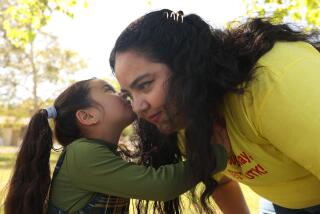Struggling in School? Try Honing Study Skills
- Share via
Taking notes, listening to teachers and doing homework on schedule--the bare-bones essentials of schooling--have instead become another subject.
More and more classes in study and test-taking skills are being offered by private tutoring services, community colleges and a range of other agencies.
The Brea Youth & Family Resource Center, for example, begins a low-cost course today meant to help fifth- through ninth-graders learn how to study for tests, take notes and listen to teachers.
“We worked a lot with educators on our youth and family advisory council, and the biggest problem they are having is with students’ focus, listening and basic studying skills,” said Triina Wiles of the center’s community services department.
In fifth grade, subject matter becomes more complicated and classroom hand-holding typically stops, Wiles said. The center hopes that by offering the courses to elementary school students as well as to older ones, kids will develop good study skills at an early age.
Courses offered today and the next two Wednesdays will cover how to study for tests, how to take notes and how to listen, in separate sessions.
One reason students today may need extra help developing study skills is that so many are overwhelmed with information. And disorganization in their personal lives can extend to their work habits, experts say.
“Kids today have much more information to deal with--cable, the Internet, videos, computers, television,” Wiles said, “and there is almost a glut.”
Many students, she said, have trouble understanding the connection between listening to teachers and earning good grades.
Successful students, however, are good at separating kernels of important information--those likely to pop up on tests--from information that is merely interesting.
At the Sylvan Learning Center in Yorba Linda, a for-profit tutoring chain, students first are tested to see what style of learning comes easiest to them.
Students who learn best by seeing or listening are encouraged to develop routines and habits that use their strengths, center director Annette Gross said.
“Study skills are essential to all of us because they keep our thought process focused and they keep us productive,” Gross said. “Most of us have our own little scenarios that help us, and each of us has a different way of learning.
“The trick is to approach learning in ways that complement that style.”
*
At Sylvan, 75 to 150 students each month are taught organization and time management, test taking, reading and study strategies and note-taking. Programs can be tailored for one-to-one tutoring or offered to groups, Gross said.
“For all these years in education, we’ve all worked hard at teaching kids,” said Scott Kambak, a Fullerton educational psychologist. “Finally people are realizing you have to teach them how to learn.”
Kambak is the executive director of Success Unlimited, a business that offers tutoring and other services. Kambak and his staff teach skills such as note-taking, outlining, time management and specific study strategies for different kinds of material, such as math and history.
With the proliferation of private learning centers, specialized help is readily available for parents. But it doesn’t come cheap. Individual sessions at Success Unlimited cost $40. At Sylvan Learning Centers, seminars range from $175 for eight hours of instruction to $595 for 18 hours. Private sessions cost $36 to $42 an hour.
The Brea Youth & Family Resource Center requests a donation of only $4 per session.
Summer is an important time to keep kids learning, says Larry Lambert of Kumon Math & Reading Centers, a private learning program that has 140 locations in Southern California, including 30 in Orange County.
“We all know that whatever you don’t use you lose. So by continuing to do math and reading over the summer, just 10 or 20 minutes a day, you don’t have that shock when you go back to school,” Lambert said.
Just two minutes a night working with flashcards can help a child move ahead, Lambert said. But he advises parents not to overdo it either.
“We recommend to parents to be sure that the children are working an appropriate length of time,” Lambert said. “Most good learning will come in 20-minute spurts, with breaks in between. The older a child gets, the longer they are able to study.”
Kambak cautions that overeager parents can sometimes contribute to children’s difficulties by increasing their anxiety.
“Kids are coming to us absolutely stressed out,” Kambak said. “I teach stress reduction to 4-year-olds.
“There’s just so much emphasis on education. That’s the good news; and that’s the bad news because that puts a lot of stress on kids who aren’t as well-prepared.”
Kambak urges families to find a balance among education, extracurricular activities and family time.
“It’s the balance that I think is most important and is typically missing in some families,” he said.
More to Read
Sign up for Essential California
The most important California stories and recommendations in your inbox every morning.
You may occasionally receive promotional content from the Los Angeles Times.










